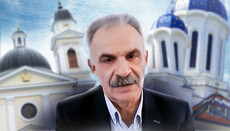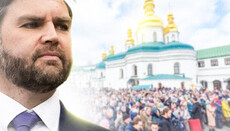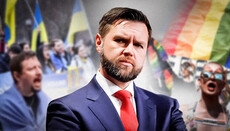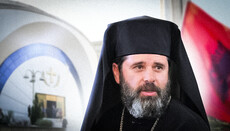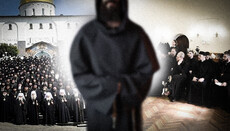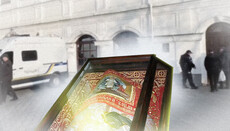Is an external Moscow cleric trying to split the UOC?
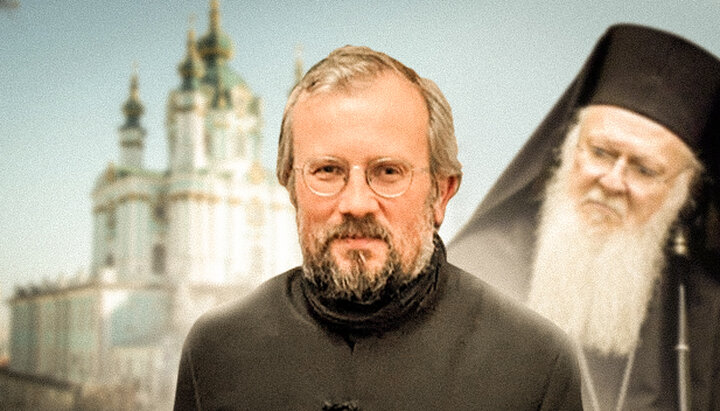
Today, when Ukraine needs unity like air, Phanar's agents are promoting a project to actually split the UOC.
War is a litmus test for the whole country. But it is particularly hard for the clergy and believers of the UOC. Your heart breaks when you realize that people, with whom you are in spiritual unity, are fighting against you and your family. How to respond to those who accuse you of connection with the aggressor? Where can one find strength to remember that the Church is the Body of Christ and stands above the world, above states, above any geopolitical conflicts; that a Christian cannot succumb to hatred, albeit the most justified and fair? Moreover, is it possible not to hate when residential buildings, hospitals and – which is mind-blowing – God's temples fall under shelling?
Because of the war, the unity of the UOC was threatened. A huge number of communities of the UOC have ceased to make a liturgical mention of Patriarch Kirill. There were calls for the proclamation of full autocephaly, which find sympathy among a significant part of the clergy and believers. At the same time, the whole rhetoric about terminating the commemoration of Patriarch Kirill suggests a declaration of loyalty to the UOC and its Primate, His Beatitude Onuphry. This means that both the clergy and the laity are aware of their belonging to the Church of Christ and are not going to break their unity with Her.
Another turmoil in Ukraine
However, some circles are quite prompt to use the war of the Russian Federation against Ukraine in their own interests. The "barkers" from the UOC-KP and the OCU greatly stepped up their activity. But the main danger, like three years ago, comes from Turkey. The UOJ learned that the Patriarchate of Constantinople had decided to secretly create another church jurisdiction in Ukraine, separated from both the Russian Orthodox Church and the OCU. Its task is to attract those priests who, on the one hand, do not consider it possible for themselves to continue to remain under the jurisdiction of the ROC, but on the other hand, do not want to unite with the OCU. As a matter of fact, such a structure already exists in Ukraine. This is the "Stavropegia of the Ecumenical Patriarchate in Ukraine", which is based in St. Andrew's church in Kyiv and is headed by Bishop Michael (Anischenko) of Coman.
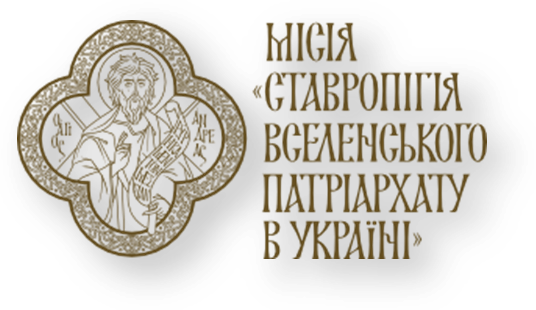
However, those willing are invited not to bother with various administrative issues, decide on jurisdictions, and so on. The adherents of a new UOC-splitting project call to simply commemorate Patriarch Bartholomew at the service.
The engine of this project in the public space is Archimandrite Kirill (Govorun) of the Russian Orthodox Church. Most likely, he is not a key figure but he is the one to broadcast narratives through the media that it is time for everyone to obey to Phanar and create some kind of a new association under his strict guidance. On March 12, 2022, Kirill Govorun posted the following message on his Facebook page: “We had the opportunity to discuss the situation in Ukraine in great detail. It was evident that the Patriarch (Bartholomew – Ed.) was sincerely with the people of Ukraine in their tribulations. I was also glad to see that we are, as they say, on the same page in understanding new reasons for the consolidation of Ukrainian Orthodoxy. For example, he does not deny the possibility of being commemorated without any additional canonical procedures by those who see no other options for themselves, including through joining the OCU.”
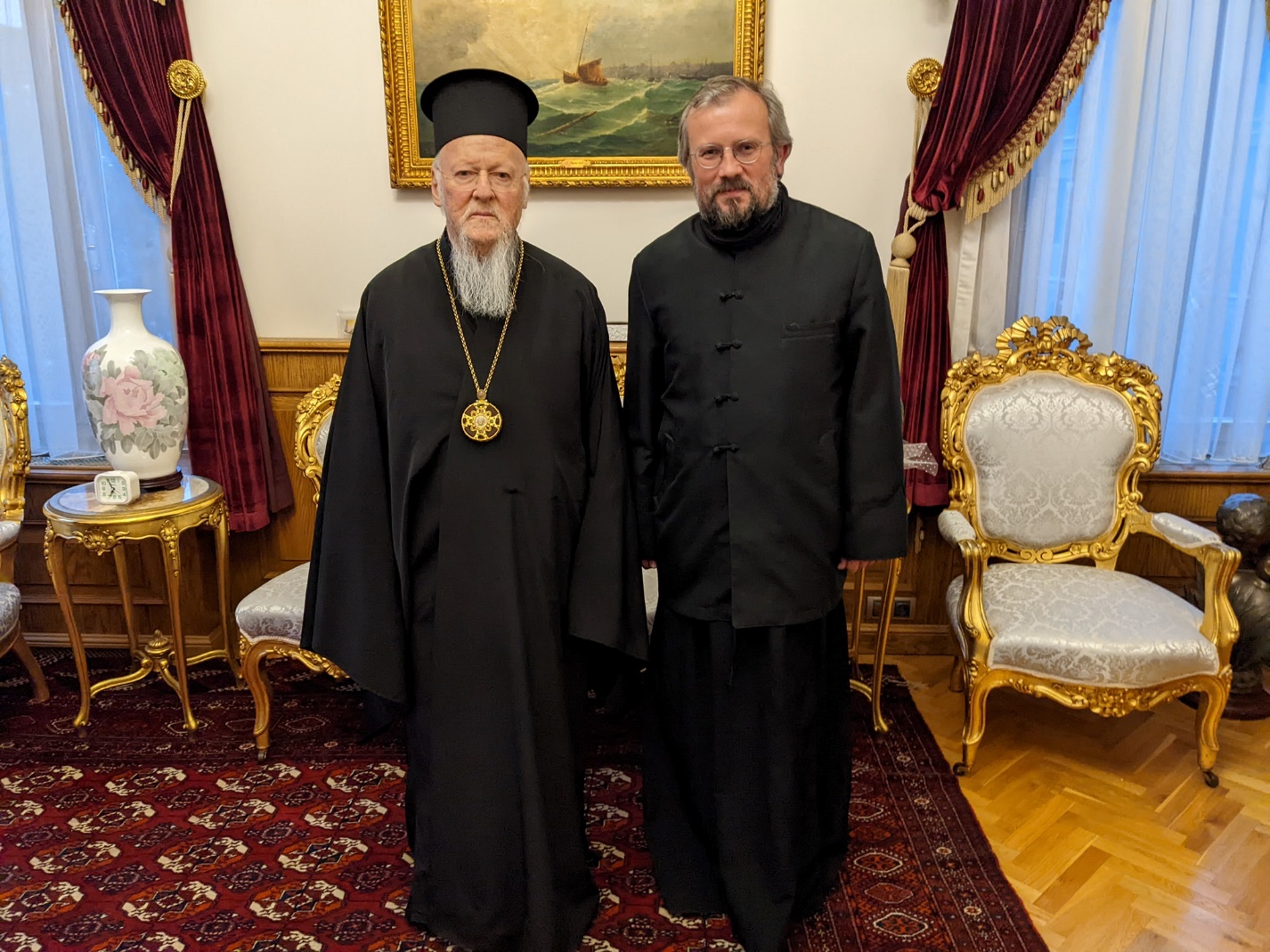
Govorun’s canonical status
Interestingly, the magnitude and canonical status of the cleric of the Russian Orthodox Church hardly implies personal communication with the “head of Orthodoxy”, and even more so, a discussion of such important issues in Ukraine. Who is Govorun in general and how did he end up on Phanar?
In an interview with the Religion Today YouTube channel dated November 17, 2019, he himself answered the following question about his status: “I am a provincial cleric of the Moscow diocese of the Russian Orthodox Church.” Since then, as far as can be understood from public sources of information, this canonical status has not changed. On his Facebook page, Archimandrite Kirill (Govorun) does not indicate that he is a cleric of Constantinople or any other Local Church, nor does he indicate his belonging to the Church in general.
The fact of Govorun's concelebration with the "priests" of the OCU is also an established fact. On January 7, 2020, he participated in the "liturgy" in the refectory church of St. Sophia of Kiev. Why after that he was not banned by the Russian Church from the priesthood remained a mystery. Moreover, Govorun has publicly stated more than once about ignoring the decrees of the Russian Orthodox Church. On June 17, 2021, in an interview with the Detector.ua YouTube channel, he stated that he freely concelebrated with the Phanar clergy: “In principle, I am one of the few and perhaps the only cleric who is in full Eucharistic communion within the entire Orthodox world.”
Curiously, Patriarch Theodoros also hosted Govorun, and the latter heralded to the world that the decision to recognize the OCU came to the former "after much thought and prayer."
It is unlikely that the visit to Phanar and the subsequent active media activity of the cleric of the Russian Orthodox Church regarding the future of ecclesiastical Ukraine is an accident.
All these facts indicate that Govorun is not just an ordinary archimandrite: individuals of the scale of Theodoros and Bartholomew do not get along with such people just like that. This is a kind of “Mata Hari” of a near-church spill, required for the execution of specific delicate assignments. It is unlikely that the visit to Phanar and the subsequent active media activity of the cleric of the Russian Orthodox Church regarding the future of ecclesiastical Ukraine is an accident.
In general, there is a very interesting scheme: an external cleric of the Moscow diocese is negotiating with a Turkish citizen about certain actions in the territory of Ukraine, which is repelling the military aggression of the Russian Federation. Moreover, these actions, as we will see below, are supposed to cause a split in the UOC at a time when the president and religious leaders say that we need unity within the country more than ever before.
Project to split the UOC
The essence of the project was outlined by Govorun in an interview with the Hromadske Radio agency dated March 5, 2022.
“The most common idea that is currently being discussed in the Moscow Patriarchate in Ukraine is to stop making a liturgical mention of Patriarch Kirill. This is the simplest, but it is only a symbolic step. Simultaneously, there is a discussion of the UOC-MP proclaiming autocephaly. This is about the same thing that Patriarch Filaret once did.
The option that I propose is that parishes can already commemorate the Ecumenical Patriarch at their liturgies. Then, when there is a calm time, the churches can get together again ... And together with the OCU, they can discuss how to coexist together. The process of unification of Ukrainian Orthodoxy may be completed now as a consequence of this war. For this purpose, of course, self-denial is needed for each of the Ukrainian churches,” Govorun said.
From his last words it follows that he does not propose a split, but, on the contrary, the unification of Ukrainian confessions. However, this is only at first glance. In fact, the wickedness here begins with the words about the possible (and not yet obvious) proclamation of the autocephaly of the UOC. More precisely, about drawing an equal sign here with the actions of Filaret Denisenko in 1992, which is completely incorrect.
In 1992, the fullness of the UOC at the Kharkiv Council resolved to remove Filaret from the post of Primate of the UOC and to ban him from the priesthood. After that, Filaret performed false consecrations of several "bishops" and together with them organized a false council, at which he proclaimed "autocephaly". More precisely, he did not even proclaim, but declared the unification with the Ukrainian Autocephalous Orthodox Church and did it even without the knowledge of the UAOC head, "Patriarch" Mstislav.
It was a real schism, into which Filaret backslid personally alongside two more bishops of the UOC, who had been already banned from the priesthood. A number of communities joined them, but not a single diocese, not a single monastery, not a single educational institution fell into schism.
We will not talk about the possible proclamation of autocephaly of the UOC, since it is impossible to analyze what does not exist. But one can say about the autocephaly of such Churches as the Romanian, Bulgarian and some others. They proclaimed their autocephaly unilaterally, contrary to the opinion of the Patriarchate of Constantinople, but this proclamation took place on behalf of the entire episcopate and church people. It means that the entire Church in the respective territory sought autocephaly, rather than individuals, as in the case of Filaret Denisenko.
The next moment that Govorun manipulates is the equalization of “each of the Ukrainian churches”, which, in his opinion, should agree to “self-denial” for the sake of “unity”.
However, the UOC is the true Church of Christ, while the OCU, like its predecessors, the UOC-KP and the UAOC, are denominations that broke away from the Church. At the same time, the decision of the Patriarchate of Constantinople dated October 11, 2018 on the accession to the Church of “Filaret Denisenko, Makariy Maletich and their followers” does not make any difference. After all, the sin of schism, like any other sin, is healed by repentance and nothing else. In fact, there was there no repentance and reunion with the Church. How should Govorun's call for "self-denial" in relation to the UOC be understood in this sense? Does the UOC have to renounce the grace of God that abides in Her and agree that grace also abides in schism?
Why one shouldn't give in to temptation
Firstly, Govorun calls to commemorate Patriarch Bartholomew and then to hold a new Council not for all the clergy of the UOC, and even more so not for the entire episcopate, but only for those “who see no other options for themselves, including through joining the OCU.” A potential division is clear.
The hierarchy of the UOC, on the contrary, calls for unity and says that the UOC should decide its own fate only conciliarly. For example, on March 2, 2022, Metropolitan Anthony of Boryspil and Brovary, Metropolitan of the UOC, said, “Do not succumb to provocations – all church issues should be considered and resolved exclusively in a canonical way and with a conciliar mind. Furthermore, all this should be done not under the roar of military explosions, but in the peace of Christ and prayer.”
That is, it is not the opinion of individuals and not even the desire for autocephaly among a significant part of believers that is put at the forefront, but the will of God, which manifests itself precisely in the conciliar way of decision-making. In other words, if there is the will of God, the UOC will have autocephaly, if not, it will not. In any case, it must preserve its internal unity.
Secondly, Govorun calls to turn a blind eye to the problem of non-canonicity (in other words, absence) of consecrations of the “episcopate” of the OCU and just get together and somehow unite or agree on coexistence. However, it is precisely the invalidity of ordinations that does not allow not only to carry out any unification actions with representatives of the OCU, but also prevents other Local Churches from recognizing this structure.
For example, the Primate of the Albanian Church, Archbishop Anastasios, speaks about this as follows:
“The same sorrow and tormenting anxiety about the preservation of the unity of the Orthodox Church forces us to express fundamental doubts about the retroactive recognition of ordinations performed by a deposed, excommunicated and anathematized person. <...> All the time, while Mr. Filaret was deposed and anathematized, he performed non-canonical rites, which were not real sacraments. Therefore, the consecrations performed by him are invalid, empty, devoid of Divine Grace and the work of the Holy Spirit. Among others, successive consecrations of his secretary Sergei Dumenko as a deacon, a priest, and, finally, as a bishop, now Metropolitan Epifaniy. <…>
It is recognized pan-Orthodoxly as a basic ecclesiological principle that the ordinations of heretics and schismatics, and especially those deposed and excommunicated, as 'sacraments' performed outside the Church, are invalid. This basic principle is inextricably linked with the Orthodox teaching on the Holy Spirit and constitutes the unshakable foundation of the apostolic succession of Orthodox bishops. We are convinced that it is unacceptable to neglect this principle.”
Such a long quotation is cited here in order to show how grave the issue of the lack of grace of the “episcopate” of the OCU is. In addition, Archbishop Anastasios is not alone in this respect.
Neither the decision of the Patriarchate of Constantinople,nor the military aggression of the Russian Federation makes the “episcopate” of the OCU grace-filled.
In response to the demand of Patriarch Bartholomew to recognize the OCU, the Primate of the Polish Church, Metropolitan Sawa, said at the end of 2018: “Filaret Denisenko was defrocked and demoted to a lay position. Then he would 'initiate' his new followers. These are people without the grace of the sacrament. <...> Filaret and his followers do not show repentance, remorse, humility, which usually precede the lifting of bans! It never happened and therein lies the problem. Therefore, they cannot be recognized as real shepherds who can perform the sacraments. The so-called 'Metropolitan' Epifaniy, in fact a layman, was inflicted harm."
In other words, neither the decision of the Patriarchate of Constantinople nor the military aggression of the Russian Federation makes the “episcopate” of the OCU blessed.
Thirdly, even without uniting with the OCU in the future, today's commemoration of Patriarch Bartholomew as their primate means a betrayal of the UOC and His Beatitude Metropolitan Onuphry and the actual transfer to the jurisdiction of the Patriarchate of Constantinople. At the same time, two processes evolving in the Patriarchate of Constantinople, which, in essence, constitute a departure from Orthodoxy as such, are still there. This is the development of the heresy of Constantinople papism, according to which the head of the Church is actually the Patriarch of Constantinople, and the course towards unification with the Vatican, i.e. in fact, a new union, in which all those who recognize the supremacy of Patriarch Bartholomew will invariably be involved.
Even if we assume that some part of the UOC communities will succumb to the temptation and follow the advice of Govorun, but the majority will still remain loyal to the UOC and Metropolitan Onuphry, a real split will occur within the UOC. Therefore, what Govorun voices is not at all unification, but on the contrary, separation of believers. It is precisely the same separation that occurred as a result of the creation of the OCU. After all, from the very beginning it was clear that the majority of the episcopate of the UOC would not support the idea of Phanar-granted “autocephaly” for Ukraine, which means that it would split the UOC.
Perhaps this is exactly what the initiators of this project sought. However, the UOC remained united. Only two bishops left it, several dozen communities voluntarily transferred to the OCU, and several hundred more churches were seized. The OCU itself was split soon after its establishment. Filaret Denisenko left this organization and is now actively recreating his UOC-KP.
What Govorun is voicing is not at all unification, but on the contrary, separation of believers.
Now the idea of transferring to the Patriarchate of Constantinople by simply commemorating Patriarch Bartholomew at the Divine Liturgy again aims to divide the UOC.
Dumenko is unhappy
It is safe to say that the OCU is by no means enthusiastic about the ideas voiced by Govorun. After all, if one fancies the UOC being subordinate to Bartholomew and then agree to the "Unification Council 2.0", then it will dominate due to the number of its episcopate and believers.
Apparently, Govorun himself realizes this now, since he published a clarification of his position on Facebook, which, in fact, changes it completely: “I can see some second-guessing on what I did not mean by proposing a unification council. I already wrote that it should emanate from the unification council of December 15, 2018, as well as from the Tomos of the Ecumenical Patriarchate of January 6, 2019. It is not a matter of creating some kind of a new church. Ukraine already has a local church. We are talking about a joint conciliar discussion of the format of canonical coexistence together with those willling from the UOC-MP.”
Consequently, it is no longer about the necessity of self-denial for each of the Ukrainian churches, nor is it about finalizing the process of unification of Ukrainian Orthodoxy as a result of this war. What then? it is the division of the UOC into those who remain faithful to Metropolitan Onuphry, and those who go over to Patriarch Bartholomew. That is, the religious situation will be even more intricate; there will be even more hostility and discord among religious denominations with another line of division in Ukrainian society.
Loyalty to the good helmsman, His Beatitude Metropolitan Onuphry, is a pledge that we will get through all the hardships and become even stronger and more united.
Instead, the UOC proposes to preserve the unity of the Church, to defend the Motherland together, to help the suffering and destitute, and to pray for an early peace. After the arrival of this peace, the future fate of the UOC can be determined conciliarly, in prayer and consent. We are all now responsible for the fate of Ukraine and the fate of our Church. Rocking the boat in a storm can only lead to its perish. Instead, concerted actions of the crew, loyalty to the good helmsman, His Beatitude Metropolitan Onuphry, is a pledge that we will get through all the hardships and become even stronger and more united.
